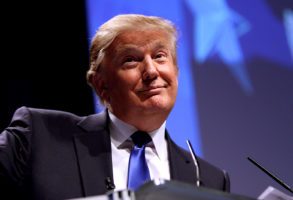
Published February 7, 2017
If you haven’t already, you really ought to read Rich and Ramesh’s superb cover piece in the latest issue of NR. They take up the question of nationalism, and its relation to conservatism.
There’s a lot to think about and learn from in the piece, but two points struck me above all as worth digging into a bit. One has to do with the relationship between American nationalism and American exceptionalism; the other is about the links and tensions between nationalism and localism.
First, when they take up Trump’s approach to American nationalism, Rich and Ramesh write:
If Trump has pointed the GOP back to a more secure and realistic grounding in nationalism, his version is lacking in important respects. The country’s founding ideals, history, and institutions barely enter into his worldview. Too often he seems to want to make America great without appreciating what makes it exceptional.
They don’t linger on that point too much, but maybe it’s worth a further word. I think it gets at something vitally important about the (usually) fairly moderate character of American nationalism. It has always seemed to me that liberal critics of American exceptionalism (as President Obama sometimes was) fail to see that what goes by the name of American exceptionalism is actually a moderating influence on American nationalism, because it holds our nationalism up to a standard rather than using nationalism itself as a standard. In other words, our idealistic sense of what America stands for gives us high expectations of ourselves that we sometimes actually take seriously.
Trump’s appeals to nationalism, which certainly seem genuine and which are also in some important respects constructive and valuable, do not benefit from this moderating tendency. Trump champions American nationalism but not American exceptionalism.
As Stephen Wertheim recently noted in Foreign Affairs, Trump has been pretty clear about this. He has said he is uncomfortable asserting that America is exceptional, perhaps especially because others wouldn’t like to hear it. In April of 2015, for example, Trump was interviewed by a Tea Party group in Texas, and was asked whether American exceptionalism still existed. You can see his answer here. He began by putting himself in the shoes of a Russian or German and said, in part:
Ok well I don’t like the term, I’ll be honest with you. Look, if I’m a Russian, or I’m a German, or if I’m a person you do business with, why? I don’t think it’s a very nice term, you know, ‘we’re exceptional, you’re not.’
First of all Germany’s eating our lunch. So they’d say ‘why are you exceptional, we’re doing a lot better than you.’ I never liked the term…
I want to take everything back from the world that we’ve given. We’ve given them so much. On top of taking it back, I don’t want to say we’re exceptional.
But there is more to the view Trump lays out on this point, and his inaugural address illustrates it with particular force. His core complaint in the speech is that America’s leaders have not even lived up to the minimal standard of putting their own nation first in their own thought and action, as the leaders of other nations do:
For many decades we’ve enriched foreign industry at the expense of American industry, subsidized the armies of other countries while allowing for the very sad depletion of our military.
We’ve defended other nations’ borders while refusing to defend our own. And we’ve spent trillions and trillions of dollars overseas while America’s infrastructure has fallen into disrepair and decay.
We’ve made other countries rich while the wealth, strength, and confidence of our country has dissipated over the horizon.
This requires a change of priorities that would have us put our nation first:
From this day forward, it’s going to be only America first, America first. Every decision on trade, on taxes, on immigration, on foreign affairs will be made to benefit American workers and American families. We must protect our borders from the ravages of other countries making our products, stealing our companies, and destroying our jobs.
And this simple change will help turn our fortunes around. This doesn’t mean that we aggressively undermine other nations, only that we put ourselves first, just as they do. Indeed, precisely that is articulated in the speech as the core principle of Trump’s foreign policy thinking:
We will seek friendship and goodwill with the nations of the world, but we do so with the understanding that it is the right of all nations to put their own interests first.
We will finally behave as all nations are entitled to behave. And once we do that, we will be better able to address the shortage of unity that undermines our own society:
At the bedrock of our politics will be a total allegiance to the United States of America, and through our loyalty to our country we will rediscover our loyalty to each other.
When you open your heart to patriotism, there is no room for prejudice.
The Bible tells us how good and pleasant it is when God’s people live together in unity. We must speak our minds openly, debate our disagreements honestly, but always pursue solidarity. When America is united, America is totally unstoppable
This is certainly a case for unity, and as I suggested on the day of Trump’s inauguration I think it’s more coherent (if not more practical) than it’s generally given credit for. But it is a case for unity rooted in a case for America’s normality—or its potential for normality—not its distinctness. We ought to love our country because it is our country, as the people of every nation ought to love their nation for being theirs.
In this sense, Trump’s case is not unlike the point President Obama made when asked whether he believed in American exceptionalism in 2009. Obama said:
I believe in American exceptionalism, just as I suspect that the Brits believe in British exceptionalism and the Greeks believe in Greek exceptionalism.
Conservatives have (rightly) harped on this response for eight years, and may never let him live it down. But Trump’s logic is very similar in principle to Obama’s. And the critique of America implicit in this way of thinking about the question came out in the now infamous exchange Trump had with Bill O’Reilly just this past weekend, which began when Trump said he respected Russian president Vladimir Putin:
O’REILLY: But he’s a killer though. Putin’s a killer.
TRUMP: There are a lot of killers. We’ve got a lot of killers. What, do you think our country’s so innocent? You think our country’s so innocent?
O’REILLY: I don’t know of any government leaders that are killers.
TRUMP: Well — take a look at what we’ve done, too. We made a lot of mistakes. I’ve been against the war in Iraq from the beginning.
O’REILLY: Yes, mistakes are different than –
TRUMP: We made a lot of mistakes, OK, but a lot of people were killed. So, a lot of killers around, believe me.
Trump here advances an equivalence that amounts to a disgusting slander against our country, unlike anything that any sitting president has ever said of us before. And he means it, at least if you take seriously the dark portrait he paints of America on almost any occasion that calls for some reflection or a display of rhetoric. I don’t think he means it as an insult, but he does seem to mean it. And it is, in a sense, a natural extension of the equivalence at the core of his brand of American nationalism.
But American nationalism doesn’t have to be this dark and harsh, and it usually isn’t. One of the means by which American nationalism can be enlightened and moderated—and one of the reasons that our nationalism has never quite gotten away from us in the way some European forms sometimes have—is the simultaneous concreteness and abstraction of our nationalism: It is a devotion to a people devoted to a set of ideas.
The ideas aren’t what matters most. The people are. And forgetting that, as we on the Right sometimes do, is a very great failing. An overly abstract idealistic Americanism has contributed a lot to the failure of our politics in recent years. You can see it in particular in the immigration debates, and more generally in the unrequited desire for solidarity that drives a lot of the populism we now see. I’ve taken up that point around here before in recent years, most recently after the Brexit vote.
But the ideas and ideals are nonetheless also crucial to what makes American nationalism a force for good. And they are also what unites American nationalism with American exceptionalism. We cannot truly respect ourselves as a people without a story rooted in what has made us distinct. Ross Douthat wrote insightfully about this challenge this past weekend.
The ideas that have always driven our national life are aspirational, not simply descriptive. They form, as Abraham Lincoln put it,
a standard maxim for free society, which should be familiar to all, and revered by all; constantly looked to, constantly labored for, and even though never perfectly attained, constantly approximated, and thereby constantly spreading and deepening its influence, and augmenting the happiness and value of life to all people of all colors everywhere.
Finding a balance between this rather abstract and conceptual nationalism and the concrete and experiential nationalism essential to a healthy politics is no easy matter. To achieve it, we have to see that over-abstraction is actually a danger that threatens both a nationalism of ideas and a nationalism of home and hearth. A nationalism that is purely a love of one’s own because it is one’s own comes after all to be shorn of content. Because everyone has something that is his own, the pure love of one’s own renders everything equal and denies all claims to preeminence. It is ultimately not about what we love but about its being ours. But we love America because it is lovely, not only because it is ours. And when we deny this, or simply do not see it, we make America less lovely and we lose the restraint upon nationalism that the limits of loveliness make possible.
This is why abstraction away from our interpersonal reality poses a grave danger to any constructive nationalism. A balanced nationalism needs to be balanced on all sides by the concrete. And to see how that balance might be possible requires recourse to the other point that Rich and Ramesh nicely highlight in their essay.
Simply put, nationalism can be understood as opposed to localism or as opposed to globalism. It can be a way to broaden the scope of community or to constrain it. And the two are not the same. Hamiltonian nationalism (and the progressive nationalism that arose in no small measure in response to a progressive federalism a century ago) opposed itself to localism and pointed toward an unlimited cosmopolitanism, or at least an instinct for centralization. In laying out his “new nationalism” in 1910, Teddy Roosevelt put it this way:
The New Nationalism puts the national need before sectional or personal advantage. It is impatient of the utter confusion that results from local legislatures attempting to treat national issues as local issues. It is still more impatient of the impotence which springs from over division of governmental powers, the impotence which makes it possible for local selfishness or for legal cunning, hired by wealthy special interests, to bring national activities to a deadlock. This New Nationalism regards the executive power as the steward of the public welfare.
President Obama warmly celebrated this speech on its hundredth anniversary. President Trump often embodies its spirit.
It offers one (rather obvious) sense in which nationalism can be a unifying force, a force for solidarity as Trump suggested in his inaugural. But contemporary nationalism is actually at least as frequently understood as a counterforce not to localism but to globalism. And indeed, this form of nationalism can be an extension of localism and a protector of it, in a way that again would tend to moderate nationalism itself. As Rich and Ramesh put it:
The elements of American nationalism that Trump scants are moderating influences on it. They push in the direction of decentralization and localism rather than an all-powerful central government. They appropriately situate loyalty to the nation within a set of concentric circles of concern starting with the family and ending with the globe.
My friend Dimitrios Halikias recently laid out these two concepts of nationalism in a way that can further help clarify the distinctions between them. He wrote:
The first concept is the nationalism of national greatness. It is a nationalism of building high and traveling far, of lasting glory and heroic accomplishment, of emancipating slaves or enslaving freemen. This is the sort of nationalism underlying that common lament: “We just don’t do big things anymore.”
The second concept is the nationalism of cultural particularism. It is a nationalism that builds out from tangible life and which identifies the nation as an embodiment of a distinctive culture and set of mores. This is the sort of nationalism that can be described as properly traditionalist.
There are conservative and progressive forms of the nationalism of national greatness—and we are witness now also to a third form in Trump’s rhetoric that is neither quite conservative nor exactly progressive. But the nationalism of cultural particularism really only has a conservative form. Whatever name it might go by, it is crucial to American conservatism. It is also, it seems to me, the only kind of nationalism that can effectively and enduringly serve the cause of national unity. And it is ultimately inseparable from American exceptionalism.
This, I take it, is the kind of nationalism that Rich and Ramesh seek to hold up. And I’m hopeful that it might be the kind of constructive direction that the recovery of nationalism in our time could ultimately take. But it isn’t where it’s starting, and that’s worth taking seriously.
Yuval Levin is the Hertog Fellow at the Ethics and Public Policy Center.








